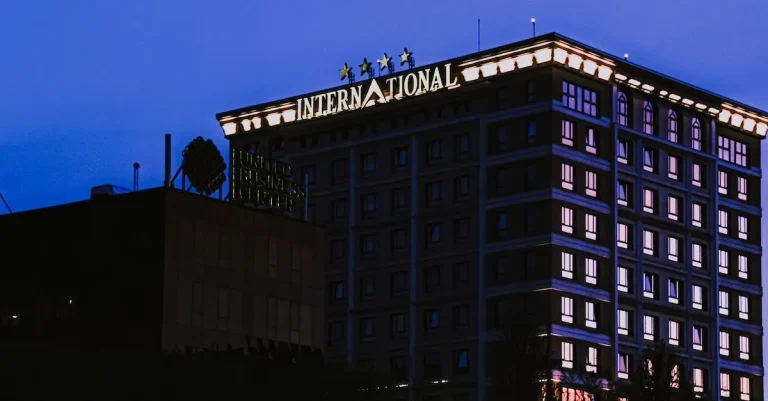Traveling on a budget adds a thrilling layer of adventure – the hunt for hidden gems, the thrill of pinching pennies, and the satisfaction of stretching your travel dollar further.
But what about the looming deposit, a potential financial hurdle that can dampen the excitement?
Fear not, intrepid adventurer, for there are hidden havens in the hotel world – cheap hotels that don’t require a deposit!
Short on time? While not every budget-friendly hotel eliminates deposits, there are clever ways to navigate around them.
This comprehensive guide equips you with the knowledge to unlock these deposit-free havens, explore alternative options, and embark on your dream trip without financial stress.
Get ready to pack your bags and dive into:
Demystifying Deposits: Understanding the Why and How
Deposit Fundamentals: Why Do Hotels Require Them?
Hotels require deposits for a few key reasons:
- To guarantee the reservation – The deposit acts as a commitment from the guest that they will in fact show up and honor the booking. This protects the hotel from losing revenue from no-shows.
- To cover incidentals – The deposit provides a buffer for the hotel to charge things to the room like room service, minibar snacks, movies, etc. This ensures guests can’t rack up a big tab and skip out without paying.
- To cover damages – Deposits give the hotel some collateral in case of smoking or damages to the room during a stay. This protects the property from having to absorb repair costs.
Basically, deposits give hotels some financial protection and help minimize wasted inventory from unpaid rooms and skipped bookings.
Many hotels will authorize the deposit amount at booking and only actually charge it in case of no-shows or damages.
Types of Deposits: Understanding the Different Options
There are a few common types of deposits hotels may require:
- Flat-rate deposit – This is a fixed dollar amount, usually $50-$200, to cover basic incidentals. It’s the most common and simplest option.
- First night deposit – Some hotels require a deposit equal to the room rate for the first night. This helps guarantee arrival.
- Percentage deposit – Typically 25-50% of the total stay cost. Gives the hotel a larger buffer for longer stays.
- Per-night deposit – Each night is authorized individually, which can minimize the upfront cost.
The type and amount can vary based on the hotel’s policies, room rate, length of stay, events/conferences, and other factors. Be sure to ask when booking to avoid surprises.
Hidden Costs Beyond Deposits: Fees and Charges to Watch Out For
While the deposit covers basic contingencies, there may be other less obvious fees or penalties travelers should be aware of:
- Early departure fees – If you check out before the booked stay is complete, some hotels charge extra fees.
- Early check-in fees – Arriving before the scheduled check-in time can incur fees in some cases.
- Late check-out fees – Staying past the hotel’s check-out time can result in hourly charges.
- Resort fees – These daily mandatory fees cover things like internet, gym access, newspapers, etc.
- Parking fees – Many city hotels charge daily self-parking and valet parking fees.
- Mini-bar charges – Those $5 waters and $10 snacks add up fast if you aren’t careful.
It’s always smart to read the fine print and ask hotels to explain any extra fees that aren’t clear upfront. Being an informed traveler is key.
The Impact of Credit Scores: How Your Credit Affects Deposit Requirements
Your personal credit score and history can actually affect deposit amounts and policies at many hotels. Some ways credit comes into play:
- Lower credit may mean higher deposit amounts required.
- Very low scores may mean non-refundable prepayment for the full stay.
- High credit scores may waive deposit requirements completely.
- Debit cards may have higher deposit holds than credit cards.
The logic is that guests with demonstrated good credit and payment history are less of a financial risk.
Those with poor credit represent more potential liability for hotels. Keeping your score high gives more booking flexibility.
Some tips: Check your credit report annually for errors, pay bills on time, and limit new credit card or loan applications. Maintaining good credit can benefit travel budgets.
Unlocking the Door: Alternative Strategies for Deposit-Free Stays
Prepayment Perks: Paying Upfront for Savings and Deposit Waiver
Paying for your hotel stay upfront can unlock great perks like discounts, upgrades, and waived deposits. Many hotels offer a discount of 5-10% for advance purchase rates booked well ahead of time.
Paying the full cost upfront shows you are a serious customer and can build trust to waive the deposit.
Loyalty Power: Utilizing Rewards Programs and Partnerships
Loyalty has its privileges when it comes to hotel deposits.
Developing status through stays or co-branded credit cards shows commitment to the brand.
Partnerships between airlines, credit cards and hotels can also provide status fast tracks and deposit waivers when you book with preferred partners. Loyalty pays!
Short-Term Advantage: Renting for Shorter Periods for Deposit Flexibility
Booking shorter hotel stays can reduce or eliminate deposit requirements. Many hotels waive deposits for 1-2 night rentals, especially last minute bookings, as the risk is lower.
Booking direct, having hotel status, and using a non-prepaid rate all better your odds of no deposit for a short stay.

Beyond the Bargain: Weighing the Pros and Cons
Financial Advantages: Avoiding Deposit Costs and Cash Flow Flexibility
Booking hotels that don’t require deposits can provide great financial benefits. You get to keep more cash in hand rather than tying it up in deposits.
This improves cash flow flexibility in case you need the funds for other purposes.
Some hotels only take a deposit 1-2 weeks before arrival, giving you time to save up. Others take payment upon check-in, letting you delay payment until your trip.
Convenience Factor: Faster Booking and Streamlined Process
Booking deposit-free hotels can save time and hassle. There’s no need to provide credit card details upfront, allowing fast, simple online booking.
You skip lengthy authorization processes for deposits, making it quicker to complete reservations.
Potential Challenges: Understanding Restrictions and Avoiding Hidden Fees
However, deposit-free hotels may have certain restrictions. There could be limits on free cancellations or changes to bookings. Read the fine print to avoid surprise charges.
Some hotels take non-refundable prepayment instead of deposits, so check for hidden fees.
Budget properties more likely waive deposits, but may charge extra for amenities.
Comparing Options: Choosing the Right Method for Your Needs
| Booking Method | Pros | Cons |
|---|---|---|
| No deposit required | – More cash flow flexibility – Faster, easier booking |
– Possible change/cancellation fees – Fewer high-end options |
| Refundable deposit | – More flexibility to change plans – Access to more hotels |
– Locks up funds until stay |
The best booking method depends on your trip plans and budget. Weigh up the pros and cons for your situation.
No deposit options work well for fixed, budget trips, while refundable deposits suit changing itineraries. With some research, you can find great hotel deals without pinching cash flow.
Hitting the Road with Confidence: Tips for a Deposit-Free Experience
Research and Compare: Find the Best Deal and Deposit-Free Options
Planning a trip can be stressful, especially when it comes to budgeting. One way to ease financial anxiety is to find a hotel that doesn’t require a deposit upfront.
Here are some tips for locating deposit-free stays:
- Use comparison sites like Trivago, Kayak or TripAdvisor to search for hotels and filter by “no deposit required.” This makes it easy to see all your no-deposit options in one place.
- Check review sites to ensure the deposit-free hotel has good feedback from past guests. This helps avoid places with sketchy policies.
- Compare rates between booking direct vs. third-party sites like Expedia. Sometimes the hotel website itself offers the best no-deposit deals.
- Look for promotions like “Stay Now, Pay Later” that let you pay upon arrival. Major chains like Hilton often run these.
Putting in the research legwork can uncover fab finds where you can reserve now without paying a cent upfront. That means more cash in your wallet pre-vacation!
Read the Fine Print: Understand Terms and Conditions Before Booking
Before confirming any deposit-free booking, carefully read the fine print to avoid surprises. Here’s what to look for:
- Cancellation policy – Know how far in advance you can cancel without penalty if plans change.
- On-site fees – Some hotels charge resort fees, parking fees or other daily add-ons at check-in.
- “No deposit” vs. “pay at hotel” – Clarify if you pay nothing upfront or pay upon arrival. Don’t assume it’s the same.
- Required ID or credit card – Many hotels still require this at check-in, even without a deposit.
Understanding the terms fully upfront prevents you from unwittingly locking yourself into charges down the road.
Protect your wallet by reading reservations closely before confirming.
Insurance Coverage: Ensure Adequate Protection for Peace of Mind
Booking travel plans without a deposit may feel risky if you lack adequate trip protection. Give yourself peace of mind by getting insurance coverage:
- Travel insurance – For ~$100-$300, this covers emergency medical costs, trip cancellations, lost baggage, and more.
- Premium credit cards – Cards like Chase Sapphire Reserve provide robust travel coverage as a perk.
- Existing health insurance – Confirm your policy extends adequate coverage when traveling domestically and abroad.
According to a 2022 survey, only 38% of U.S. travelers buy trip insurance. But protection is key for deposit-free trips, giving you a safety net if things go sideways.
Be Prepared: Have Necessary Documents and Payment Methods Ready
To check-in seamlessly when you’ve booked deposit-free, make sure to have the following:
- Government-issued ID – Driver’s license, passport or other identification required by the hotel.
- Credit/debit card – Even if not paying upfront, most hotels take an imprint in case of incidentals.
- Confirmation details – Have your reservation number handy to provide at check-in.
- Payment method – Even without a deposit, ensure you have a payment option ready, whether cash, card or traveler’s checks.
Being prepared with all necessary documents and payment gives the best deposit-free experience. You can breeze through check-in and focus on enjoying your vacation sans financial fretting!
Conclusion
While navigating the world of cheap hotels without deposits may require some savvy research and planning, the rewards are plentiful.
By understanding the options, exploring the hidden gems around the world, and making informed decisions, you can unlock budget-friendly adventures without the financial burden.
So, pack your bags, embrace the spirit of adventure, and remember, deposit-free travel is not just a dream, it’s a reality waiting to be explored!






